

Tao Te Ching
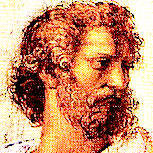
Aristotle Ἀριστοτέλης
382 – 322 BCE
Famous student of Plato and teacher of Alexander the Great, the first to organize a group to do scientific research, to systemize Western philosophy, to formalize a system of logic and to develop a theory of evolution; Aristotle is considered "The First Teacher" by Muslims and a profound influence on Judaism and Christian theology that extended through the Renaissance and continues today. Though only about one third of his writings remain and much more a proponent of the words rather than the sense, Cicero described him as "a river of gold,” Dante as “the master of those who know,” and through 1500 years of European history, “the philosopher.” He taught virtue as the secret of happiness, politics as the art of compromise between classes, and politically creating a balance between faith and reason, equality and freedom.
Eras
Western
Egyptian Civilization (3150 – 305 BCE)Greek Civilization (480 – 146 BCE)
The Axial Age, “The Great Leap of Being” (800 – 200 BCE)
Sources
Unlisted Sources
Metaphysics
Nicomachean Ethics
Politics
Rhetoric
Quotes by Aristotle (45 quotes)
“To avoid criticism say nothing, do nothing, be nothing.”
Chapters:
17. True Leaders
Comments: Click to comment
“No great mind has ever existed without a touch of madness… To lead an orchestra, you must turn your back on the crowd.”
Chapters:
18. The Sick Society
Comments: Click to comment
“Without friends, no one would want to live, even if he had all other goods.”
Chapters:
35. The Power of Goodness
Comments: Click to comment
“It is the mark of an educated mind to be able to entertain a thought without accepting it.”
Chapters:
38. Fruit Over Flowers
Comments: Click to comment
“If things do not turn out as we wish, we should wish for them as they turn out.”
Chapters:
46. Enough
Comments: Click to comment
“Poverty is the parent of revolution and crime.”
Chapters:
53. Shameless Thieves
Comments: Click to comment
“The more you know, the more you know you don't know.”
Chapters:
65. Simplicity: the Hidden Power of Goodness
Comments: Click to comment
“All paid jobs absorb and degrade the mind.”
Chapters:
72. Helpful Fear
Comments: Click to comment
“That which is common to the greatest number has the least care bestowed upon it, everybody is more inclined to neglect the duty which he expects another to fulfill.”
from Politics
Comments: Click to comment
“Justice is not a part of virtue, but virtue entire.”
Comments: Click to comment
“Myths—because of their utility in regard to social customs and the public good—were introduced to persuade the multitude.”
from Metaphysics
Comments: Click to comment
“Anybody can become angry—that is easy; but to be angry with the right person, and to the right degree, and at the right time and for the right purpose, and in the right way—that is not within everybody's power and is not easy.”
from Nicomachean Ethics
Comments: Click to comment
“As sight is in the body, so is reason in the soul.”
from Nicomachean Ethics
Comments: Click to comment
“Revolutions are not trifles, but spring from trifles.”
from Politics
Comments: Click to comment
“Democracy arose from men's thinking that if they are equal in any respect, they are equal absolutely.”
from Politics
Comments: Click to comment
“The fate of empires depends on the education of youth.”
from Politics
Comments: Click to comment
“Philosophy is the science which considers truth.”
Comments: Click to comment
“The aim of art is to represent not the outward appearance of things, but their inward significance; for this is the true reality.”
Comments: Click to comment
“The artistic representation of history is a more scientific and serious pursuit than the exact writing of history. For the art of letters goes to the heart of things, whereas the factual report merely collocates details.”
Comments: Click to comment
“The end of democracy is freedom; of oligarchy, wealth; of aristocracy, the maintenance of education and national institutions; of tyranny, the protection of the tyrant.”
from Nicomachean Ethics
Comments: Click to comment
“The true nature of anything is what it becomes at its highest.”
Comments: Click to comment
“Most of us are as sure about the truth of our opinions as the wise are about the truth of what they know.”
from Nicomachean Ethics
Comments: Click to comment
“Learning is an ornament in prosperity, a refuge in adversity, and a provision in old age.”
Comments: Click to comment
“Punishment is a kind of medicine.”
from Nicomachean Ethics
Comments: Click to comment
“That quality of the soul that thinks and judges is called mind.”
Comments: Click to comment
“I count him braver who overcomes his desires than him who conquers his enemies; for the hardest victory is over self.”
Comments: Click to comment
“It is characteristic of the human alone to have a sense of good and evil, just and unjust. And the association of living beings who have this sense makes the family and then the state.”
from Politics
Comments: Click to comment
“He alone and first of men showed plain for all to see by the life he lived, by all the words he ever spoke to men, that the good man is the happy man, now, here, upon the earth.”
Comments: Click to comment
“Beauty is a greater recommendation than any letter of introduction.”
from Nicomachean Ethics
Comments: Click to comment
“The wise become their own best friend and appreciate privacy while the man of no virtue or ability—afraid of solitude—turns into his own worst enemy”
from Nicomachean Ethics
Comments: Click to comment
“Every art and every inquiry, and similarly every action and pursuit, is thought to aim at some good, and for this reason the good has rightly been declared to be that at which all things aim.”
from Nicomachean Ethics
Comments: Click to comment
“The law is reason free from passion.”
from Nicomachean Ethics
Comments: Click to comment
“In a democracy, liberty is taken for granted because no one is free in any other kind of government.”
from Rhetoric
Comments: Click to comment
“Conflicts break out when opposite parties—the rich and the poor—are equally balanced. if one or the other were highly superior, the other side would not risk an attack.”
from Politics
Comments: Click to comment
“Educated men are as much superior to uneducated men as the living are to the dead.”
Comments: Click to comment
“When everybody owns everything, nobody takes care of anything.”
Comments: Click to comment
“Habit, my friend, is practice long pursued that at the last become the man himself.”
from Nicomachean Ethics
Comments: Click to comment
“It is Homer who has chiefly taught other poets the art of telling lies skillfully.”
Comments: Click to comment
“The unfortunate need people who will be kind to them; the prosperous need people to be kind to.”
from Nicomachean Ethics
Comments: Click to comment
“We are what we repeatedly do. Excellence, then, is not an act but a habit.”
Comments: Click to comment
“To be happy means to be self-sufficient.”
Comments: Click to comment
“Happiness appears to consist in leisure... the free exercise of any power, whatever it may be, is happiness.”
Comments: Click to comment
“What it lies in our power to do, it lies in our power not to do.”
from Nicomachean Ethics
Comments: Click to comment
Quotes about Aristotle (8 quotes)
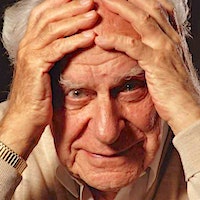
“the most deplorable fact that Aristotle, by using this complicated and somewhat pretentious jargon, fascinated only too many philosophers... Aristotle, who was a historian of the more encyclopedic type, made no direct contribution to historicism”
Comments: Click to comment
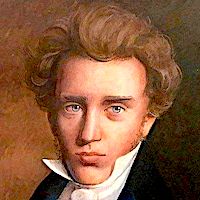
“Aristotle’s view that philosophy begins with wonder, not as in our day with doubt, is a positive point of departure for philosophy. Indeed, the world will no doubt learn that it does not do to begin with the negative, and the reason for success up to the present is that philosophers have never quite surrendered to the negative and thus have never earnestly done what they have said. They merely flirt with doubt.”
Comments: Click to comment
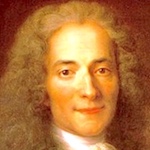
“Aristotle—whose works have been interpreted a thousand different ways because they were unintelligible—was of the opinion, if we may trust some of his disciples, that the understanding of all men was but one and the same substance.”
Comments: Click to comment
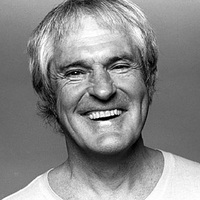
“In the information age, you don't teach philosophy as they did after feudalism. You perform it. If Aristotle were alive today he'd have a talk show.”
Comments: Click to comment

“Aristotle dines when it seems good to King Philip, but Diogenes when he himself pleases.
”
Comments: Click to comment

“Called by the Middle Ages, The Philosopher, Confucius alone has had as great an influence. But it is not that we love him; his texts expound so monotonously a passionless moderation that—after feeling the radiance of Plato—freeze at the touch of his tempered mind. But, an intellect of almost unbelievable depth and range, we shall not find again another name that so long inspired and enthralled the minds of men.”
Comments: Click to comment

“Contact with the Mohammedans in Spain, and to a lesser extent in Sicily, made the West aware of Aristotle; also of Arabic numerals, algebra, and chemistry... words we derive from Arabic such as: algebra, alcohol, alchemy, alembic, alkali, azimuth, zenith.”
Comments: Click to comment
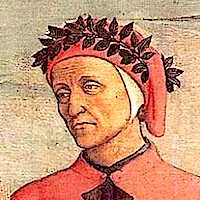
Comments (0)